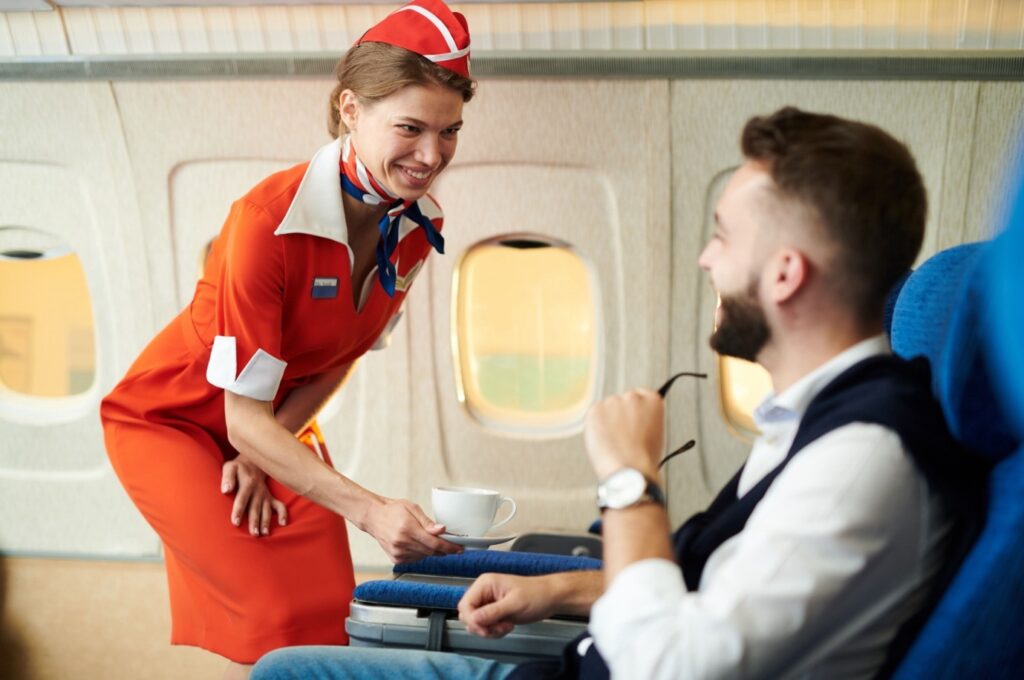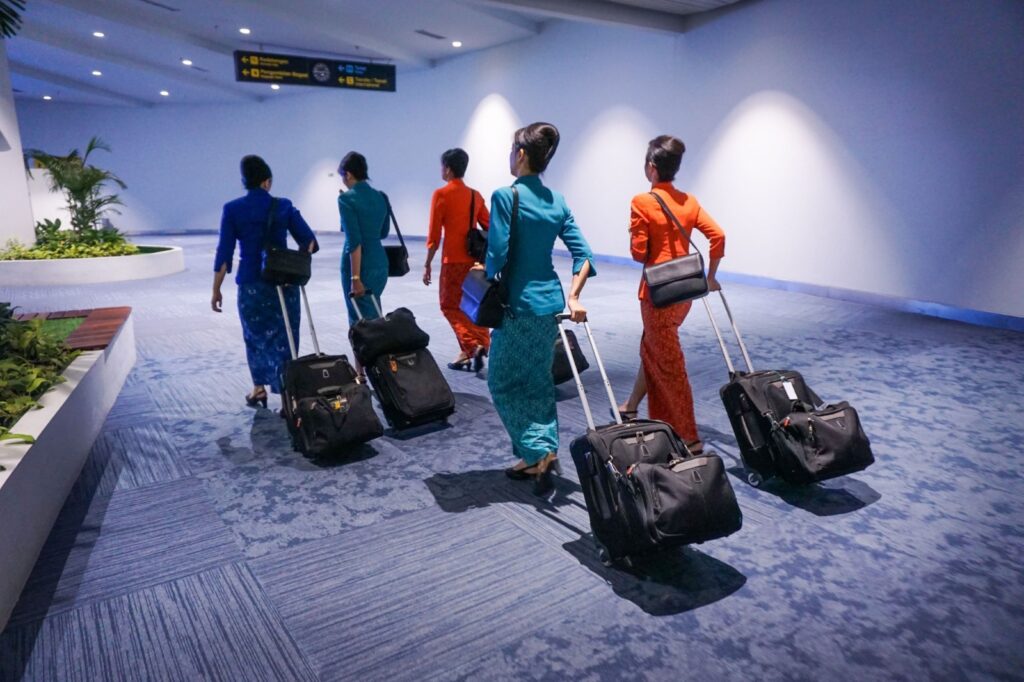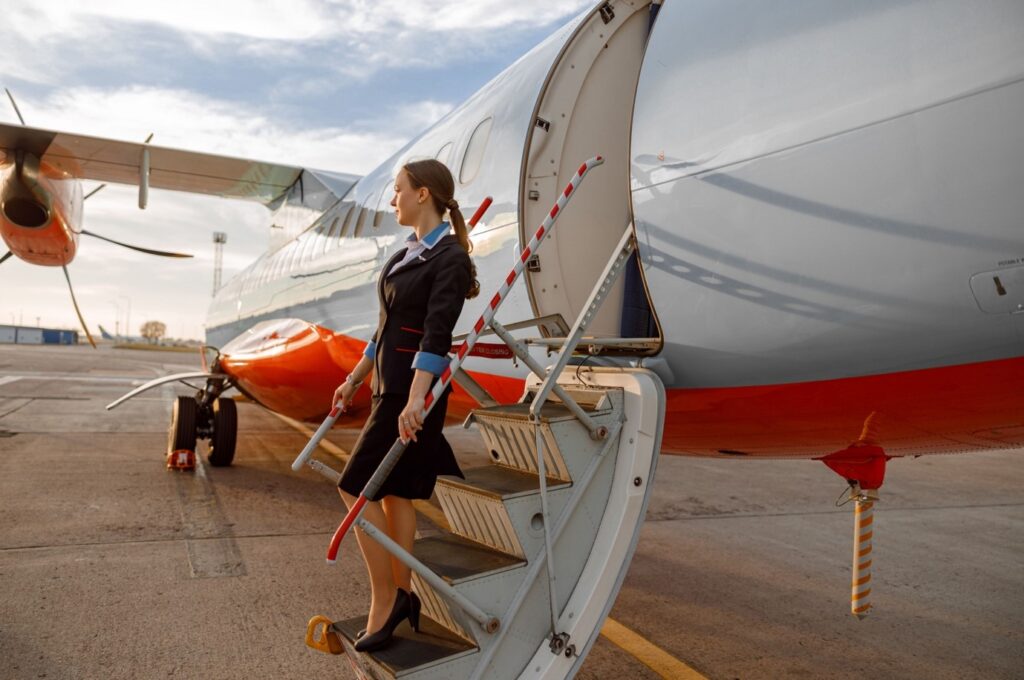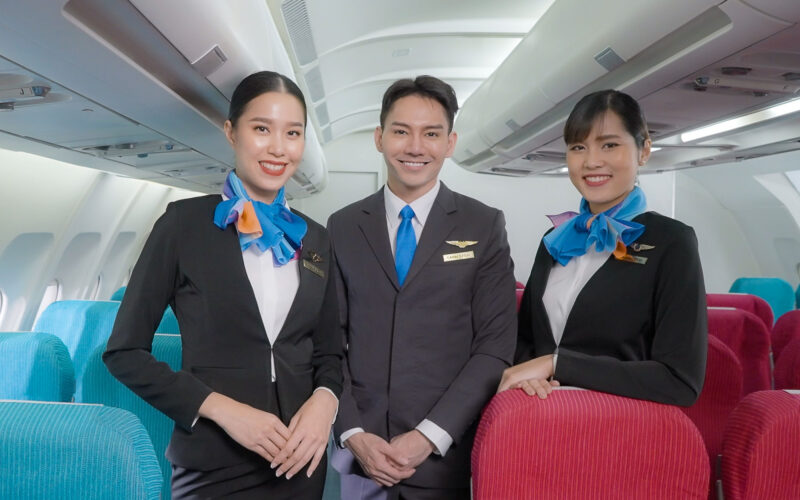For many people who have a passion for travel, customer service and adventure, becoming a flight attendant is a dream job. Flight attendants are the public face of airlines, ensuring the safety and comfort of passengers during their journeys.
If you’re interested in pursuing a career as a flight attendant, this comprehensive guide will walk you through the steps and provide essential insights to help you achieve your goal.
What Is a flight attendant?
A flight attendant, also known as a cabin crew member or steward/stewardess, is a trained airline professional responsible for ensuring the safety, comfort and well-being of passengers during flights. Their primary role is to assist and attend to passengers throughout the journey, from the moment they board the aircraft until they disembark.
Understanding the role
Before you set off on your journey to becoming a flight attendant, it’s essential to have a clear understanding of the role. Their duties include:
- Ensuring passengers’ safety by providing pre-flight safety demonstrations and responding to emergency situations.
- Observing passengers for unusual behavior.
- Assisting passengers with boarding, seating and stowing carry-on baggage.
- Assisting passengers with young children or specific health needs.
- Serving food and beverages and attending to passengers’ requests.
- Maintaining a clean cabin.
- Providing excellent customer service and resolving passenger issues.
- Ensuring the cabin is secured during takeoff and landing.
- Assisting passengers in disembarking safely after landing.

What requirements do you need to meet to become a flight attendant?
To pursue a career as a flight attendant, you need to meet specific minimum requirements:
- Age: candidates are required to be a minimum of 18 to 21 years of age.
- Education: a high school diploma or equivalent is required, although some airlines may prefer candidates with post-secondary education.
- Language Skills: fluency in English is essential, and proficiency in other languages can be an advantage, particularly if you plan to work for international airlines.
- Physical Requirements: flight attendants must meet certain physical requirements, such as height (to reach the overhead bins) and weight restrictions to perform their duties effectively. Also, it’s necessary to have good, clear vision – at least 20/40.
- Legal Eligibility: you must be legally eligible to work in the country where the airline is based.
- Clear criminal background check.
- Willingness to relocate, if necessary.
- Completion of airline-specific training programs.
Gain relevant skills and experience
To stand out as a flight attendant candidate, it’s beneficial to acquire relevant skills and experience:
- Customer Service: develop your customer service skills, as this is a fundamental aspect of the job.
- First Aid and CPR Certification: many airlines require flight attendants to have certification in First Aid and cardiopulmonary resuscitation (CPR).
- Communication: enhance your communication and interpersonal skills to effectively interact with passengers and crew members.
- Conflict Resolution: learn conflict resolution techniques, as dealing with difficult passengers can be part of the job.
10 steps to become a flight attendant
Here’s a list of 10 common steps to follow on your journey to becoming a flight attendant:
Complete your education
To become a flight attendant, you’ll need at least a high school diploma or GED (General Educational Development) test. While it’s not obligatory, having a bachelor’s degree could enhance your chances of being hired. Particularly advantageous degrees include those in fields such as marketing, hospitality, public relations, tourism, or communication.
Gain some work experience
To boost your resume, it’s beneficial to have relevant work experience. Numerous airlines require a minimum of two years of experience in roles related to hospitality, customer service or sales. Airlines seek work experience that demonstrates your ability to endure extended periods on your feet, work extra hours when necessary, offer problem-solving skills and consistently deliver exceptional customer service.
Research airlines and their requirements
Different airlines may have varying requirements for flight attendant candidates. It’s worth researching various airlines to understand their specific qualifications, such as height and language preferences. Some airlines may also require candidates to relocate to a specific base city.

Create a standout resume and cover letter
Craft a compelling resume (with cover letter) that highlights your qualifications, skills and relevant experience. Tailor your application materials to each airline you apply to, showcasing why you’re an ideal fit for their particular team.
Apply for open positions
Some valuable platforms for aspiring flight attendants to explore job opportunities are LinkedIn, online job listings and the official websites of major airlines. Be prepared to submit your application promptly when positions become available.
Prepare for the interview process
Once you receive an invitation for an interview, prepare diligently. Flight attendant interviews typically include group exercises, one-on-one interviews and assessments of your customer service and problem-solving skills. Dress professionally and be ready to demonstrate your passion for the role.
Attend flight attendant training
If you successfully pass the interview process, you’ll undergo rigorous training provided by the airline. Training covers safety procedures, emergency protocols, and the specific policies of the airline. Be prepared for three to six weeks of intense training for eight hours a day, both in the classroom and through hands-on experience.
Pass background checks and medical exams
Airlines conduct thorough background checks and medical exams to ensure candidates meet their safety and security standards. You’ll be expected to provide references and undergo medical evaluations, including drug and alcohol testing.
Pass FAA certification exams
After finishing your training, if you are in the United States, your employer will submit an application to the Federal Aviation Administration (FAA) for your Certificate of Demonstrated Proficiency. You will need a distinct certificate for each type of aircraft you are qualified to operate. To sustain your certification, you must also undertake annual training.
Prepare to be put on a reserve line
Flight attendants on reserve status frequently step in to cover shifts when colleagues are unable to work. After approximately a year, exceptional performance can lead to flight attendants being relieved of reserve duties, granting them the flexibility to transfer from their base airport and secure more favorable work schedules.

How much do flight attendants earn?
The salary of a flight attendant can differ significantly based on factors like experience, location, and the airline. However, the average annual salary for a flight attendant in the United States is around $84,146, though typically it varies between $71,577 and $100,019. Bear in mind that this figure can differ widely.
How long does it take to become a flight attendant?
The time it takes to become a flight attendant can vary. The training program provided by airlines usually lasts several weeks. However, the overall process, including the application, interviews and background checks, may take a few months, or up to one year.
What’s a flight attendant’s schedule like?
Flight attendant schedules can be irregular and may include weekends, holidays and overnight flights. They often work in shifts, and their schedules can vary from month to month.
Reserve flight attendants are typically on reserve duty for about 18 to 20 days each month, although it could be fewer. As reserve flight attendants accumulate more seniority, they may have the opportunity to enjoy additional days off.
It’s important to mention that flight attendants also frequently enjoy complimentary hotel accommodation during layovers, which is one of the perks of their job.
Do you need a college degree?
While a college degree is not usually a strict requirement for becoming a flight attendant, having one can be an advantage, especially when competing for positions at major airlines. However, many successful flight attendants only have a high school diploma.
What are airlines looking for in applicants?
Airlines typically look for candidates who possess:
- Strong customer service skills
- Excellent communication abilities
- Adaptability and the ability to work well in a team
- A commitment to safety and professionalism
- Cultural sensitivity and language skills for international routes
Additionally, airlines may have specific requirements and preferences based on their individual needs and routes.
Pros & cons of becoming a flight attendant
Pros:
- Travel opportunities
- Meeting diverse people
- Competitive benefits like health insurance
- Flexible schedules
- Discounts on flights for personal travel
Cons:
- Irregular work hours
- Time away from home and family
- Physically demanding job
- Dealing with difficult passengers
- Entry-level pay may be modest


